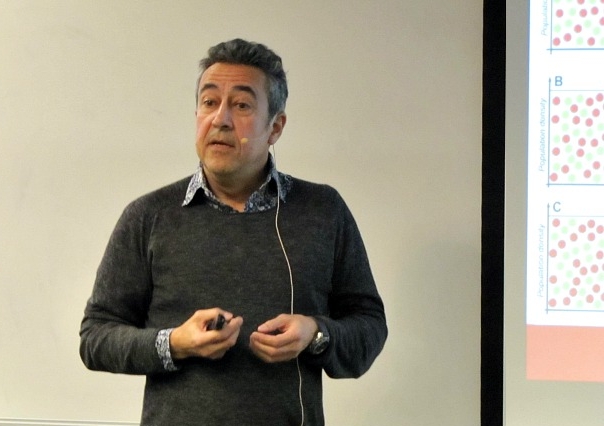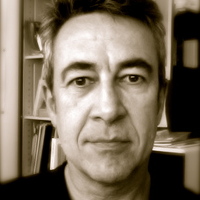NIMBioS Seminar Series
In conjunction with the interdisciplinary activities of the National Institute for Mathematical and Biological Synthesis (NIMBioS), a seminar series on topics in mathematical biology will be hosted at NIMBioS every other Tuesday at 3:30 p.m. (unless otherwise noted) in the Hallam Auditorium, Room 206, Claxton Building, 1122 Volunteer Blvd. Seminar speakers will focus on their research initiatives at the interface of mathematics and many areas of the life sciences. Light refreshments will be served in Room 205 beginning 30 minutes before each talk. Faculty and students from across the UT community are welcome to join us.
Time/Date: Tuesday, March 10, 2015, 3:30 p.m.*
Location: Room 206, Claxton Building, 1122 Volunteer Blvd.
Speaker: Dr. Laurent Excoffier, Population Genetics CMPG Lab, Institute of Ecology and Evolution, Univ. of Bern; NIMBioS Postdoctoral Fellows Invited Distinguished Visitor
Authors: Laurent Excoffier and Stephan Peischl, Population Genetics CMPG Lab, Institute of Ecology and Evolution, Univ. of Bern
Topic: Consequences of spatial expansions on population functional diversity
Abstract: It is known that spatial expansions have had a major influence on population genetic diversity: some neutral variants can increase in frequency and spread over large areas in newly occupied territories. This is the phenomenon of gene surfing. However, selected variants can also surf and thus modify the fitness of expanding populations. We have studied this phenomenon by simulations and by analytical derivations in relatively simple models of expansions in homogeneous environments. Very generally, we find that the fitness of populations located on the expansion front decreases proportionally to their distance from the origin of the expansion. The creation of this expansion load happens in 1D or 2D expansions, in case of hard or soft selection, in presence or absence of recombination and for different distribution of fitness effects. The evolutionary dynamics of this expansion load differs between cases, and also depends on the level of dominance between variants. All these cases will be briefly presented, and we will conclude by showing some evidence that this phenomenon also occurred in human populations.
*Join us for refreshments at 3 p.m. in Room 205.
Seminar Flyer (pdf)
NIMBioS seminars are available for viewing via live streaming during the talk and are archived for later viewing on NIMBioS' YouTube channel.
For more information about this and other NIMBioS Seminars, visit /seminars.

NIMBioS
1122 Volunteer Blvd., Suite 106
University of Tennessee
Knoxville,
TN 37996-3410
PH: (865) 974-9334
FAX: (865) 974-9461
Contact NIMBioS



